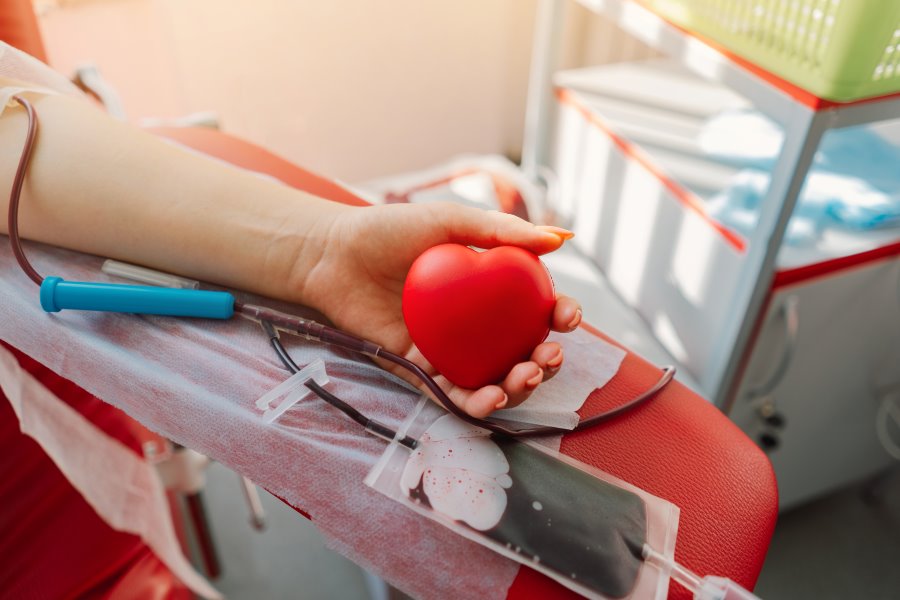When is the World Blood Donation Day?

June 14 is celebrated as World Blood Donor Day. Countries worldwide are concerned about blood shortages, which multiply when global health crises such as COVID-19 hit every corner of the world.
In such a scenario, campaigns or the celebration of honorary blood donations give health systems a ray of hope. The following sections focus on Blood Donation Day, its importance, and the benefits of celebrating the day. Read along!

Table of Contents

What is Blood Donation Day?
Observed on June 14 every year, World Blood Donor Day is an initiative by the World Health Organisation (WHO). WHO started this mission in 2004 to urge the Government and national health authorities to provide enough resources and develop infrastructure for increasing voluntary blood collection from donors.
June 14 is the Birth Anniversary of Karl Landsteiner, an Austrian Biologist and Physician. Karl Landsteiner won the Nobel Prize in Physiology or Medicine in 1930 for discovering human blood groups.
You have now obtained basic information on blood donation day from the above discussion. Let's proceed to learn about Blood Donation Day's importance, benefits, and objectives.
History of Blood Donation Day
Blood Donation Day was established by the World Health Organization (WHO) in 2004 to honour Karl Landsteiner, a man whose discoveries changed the lives of millions. Landsteiner's work in 1901 led to the identification of the ABO blood group system. This seemingly simple breakthrough made it possible to safely match blood types for transfusions, transforming a scary procedure into a life-saving practice.
Landsteiner’s discovery wasn't just a scientific achievement but a profound gift to humanity. World Blood Donor Day honours his groundbreaking contributions and highlights the incredible generosity of those who give blood. It’s a reminder that each donation is a powerful act of compassion, helping to save lives and strengthen communities worldwide.
What is the Importance of Blood Donation Day?
World Blood Donation Day is celebrated to create awareness regarding voluntary blood donation. Individuals who are medically fit and 18 years old can donate blood at the nearest blood bank and help in spreading awareness regarding the same. The worldwide celebration of this day helps to encourage youth to donate blood.
Reports show that India has the highest shortage of blood in the world and falls short of 41 million units of blood every year. If more people voluntarily donate blood, the Government can reduce the number of blood shortage cases.
Hence, celebrating World Blood Donation Day is important to ensure every individual who requires blood can get easy access to it.
Health Benefits of Donating Blood
The health benefits of donating blood highlight the importance of regular blood donation for both recipients and donors, supporting overall health and well-being. Following are a few health benefits of donating blood:
What is the Eligibility for Blood Donation?
To qualify to donate blood, people usually need to fulfil specific requirements:
What was the Theme For Blood Donation Day 2024?
Blood Donation Day 2024, celebrated on June 14th, marked the 20th anniversary of World Blood Donor Day. This year’s theme was "20 Years of Celebrating Giving: Thank You Blood Donors!" It emphasised the significant impact of blood donations and expressed deep gratitude to donors.
The event successfully highlighted the achievements and challenges of blood programs, promoted regular unpaid donations, and encouraged a culture of donation among young people. Educational activities and events helped spread awareness and motivated more individuals to become regular blood donors.
Different Ways to Celebrate Blood Donation Day

Different ways to celebrate Blood Donation Day can enhance the impact of Blood Donation Day by celebrating and raising awareness about the importance of blood donation in saving lives. Here are some suggestions to mark the occasion:
Organise a Blood Drive
Collaborate with local hospitals or blood banks to host a blood drive. Encourage participation from friends, family, and colleagues to foster community involvement and highlight the importance of blood donation.
Promote Awareness
Utilise social media platforms to share information about the significance of donating blood. Share stories of recipients and donors using hashtags. Create and distribute informative materials like flyers and pamphlets to educate others.
Host Educational Events
Arrange webinars, workshops, or community meetings to educate people about the benefits of blood donation and how to get involved. Invite medical professionals to debunk myths and encourage more people to become donors.
Appreciate Donors
Recognise frequent donors with certificates, thank-you cards, or small tokens of appreciation. Feature their stories in local media or on social platforms to inspire others to join the cause of regular blood donation.
Volunteer
Offer your assistance during various aspects of the day, such as helping with registration at blood drives, providing refreshments to donors, or setting up donor recruitment events. Volunteering shows personal commitment to supporting these initiatives.
Fundraising
Organise fundraising activities like charity runs, bake sales, or auctions to support blood drives and organisations like the American Red Cross. Funds raised help these organisations operate effectively and expand their outreach efforts.
What are the Objectives of Blood Donation Day?
The objectives of the Blood Donation Day campaign are as follows,
- Raising awareness of the necessity of safe transfusion of blood and its components.
- Imparting knowledge regarding the importance of unpaid, voluntary blood donation.
- Motivating and encouraging people who are not interested in donating blood in spite of being a healthy person.
- Thanking blood donors throughout the world and addressing the need for frequent unpaid donations.
- Encouraging youth to donate blood and inspiring others to do the same.
Now that you have all the essential information about Blood Donation Day, you can understand the cause and importance of this day and voluntarily donate blood to save lives.
Myths about Blood Donation
Several myths surrounding Blood Donation have deeply affected this selfless act's image. Here are a few myths that are not true:
- Donating blood is painful.
- Blood donation can make you sick.
- Only certain blood types are needed.
- People with tattoos/piercings cannot donate blood.
- Blood donation weakens your body.
- Senior citizens don’t qualify to donate blood.
- Blood donation is a lengthy process.
- Donating blood can cause weight loss.
- Donating blood is only for emergencies.
- Blood donation is only for those with rare blood types.
- Donating blood causes anaemia.
- You need to fast before donating blood.
- You must be a frequent donor to make a difference.
- Blood donation is only for young people.
- You can’t donate blood if you’re on birth control.
Facts About Blood Donation
Here are some interesting facts and statistics about blood donation that may bring awareness to its significance:
- Most donors feel slightly tingling, and the pain is minimal and short-lived.
- All blood donation equipment is sterile and used once only; hence, there is no risk of disease transmission.
- Patients have different blood types; hence, all blood types are required.
- If you have tattoos or piercings that have healed using sterile needles, you can donate; the waiting time between the tattooing/piercing procedure and donating may vary based on regional guidelines.
- Within a few hours, the body restores lost fluid volume, while red blood cells replenish within weeks; donating blood does not weaken the body.
- The first successful blood transfusion was performed in 1818 by James Blundell.
- According to WHO, "Of the 118.5 million blood donations collected globally, 40% are collected in high-income countries, home to 16% of the world's population."
- The Red Cross Blood Donation mentions, "Every 2 seconds someone in the U.S. needs blood and or platelets."
- Blood cannot be manufactured and must come from voluntary donors.
- Type O negative blood is the universal donor and the most requested blood type by hospitals.
- According to the Red Cross Blood Donation, "Nearly 16 million blood components are transfused each year in the U.S."
- WHO mentions, "An increase of 10.7 million blood donations from voluntary unpaid donors has been reported from 2008 to 2018. In total, 79 countries collect over 90% of their blood supply from voluntary unpaid donors; however, 54 countries collect more than 50% of their blood supply from family/replacement or paid donors."
Blood Donation Day is an annual reminder of why voluntary blood donations save lives. Whether through blood drives, education campaigns, or celebrations of donors' generosity, this day underscores the power of community and compassion in ensuring that hospitals and healthcare facilities can meet the ongoing demand for blood.
As we commemorate Blood Donation Day, let us continue to inspire and empower individuals to make a difference, one donation at a time, for the betterment of society as a whole.
Protect What Matters - Explore Other Insurance Options














